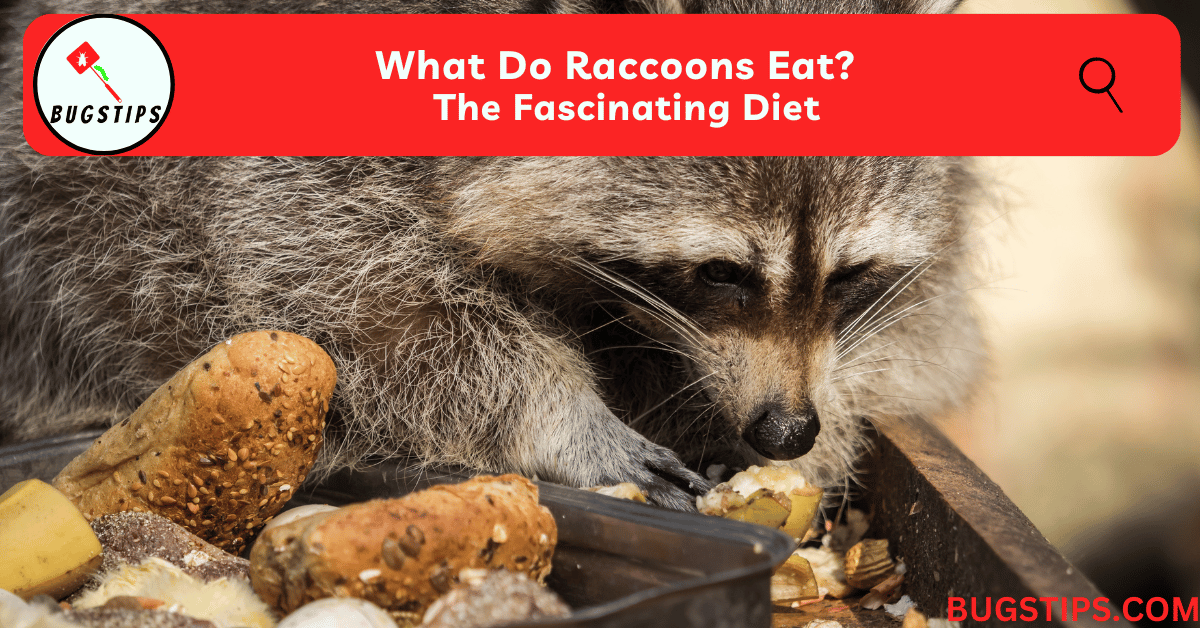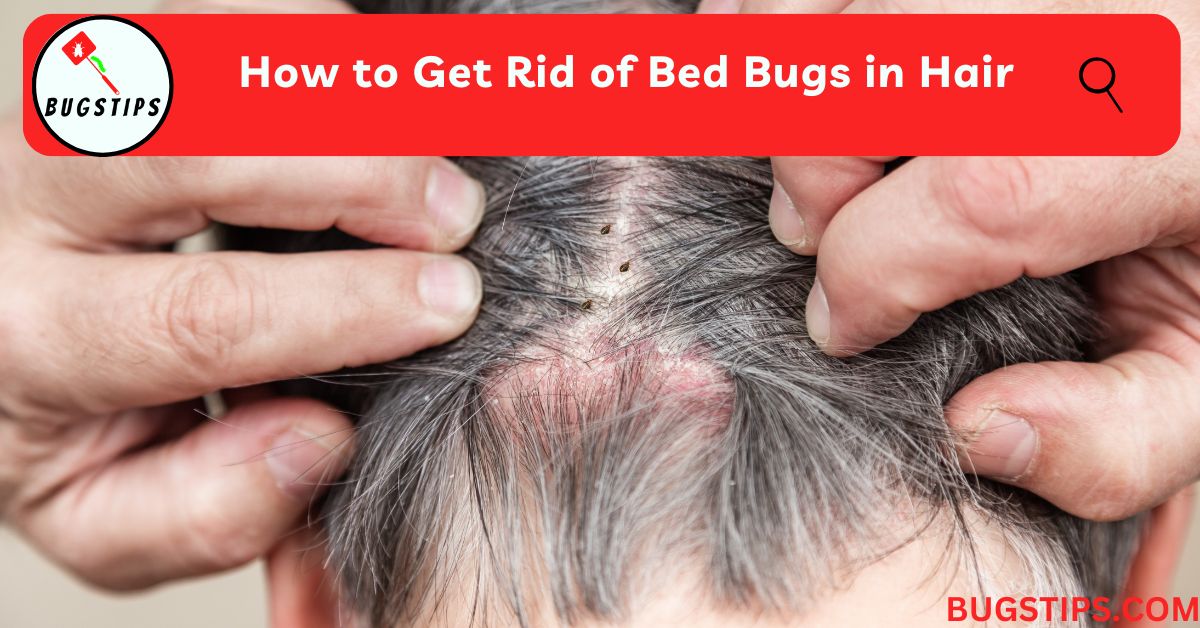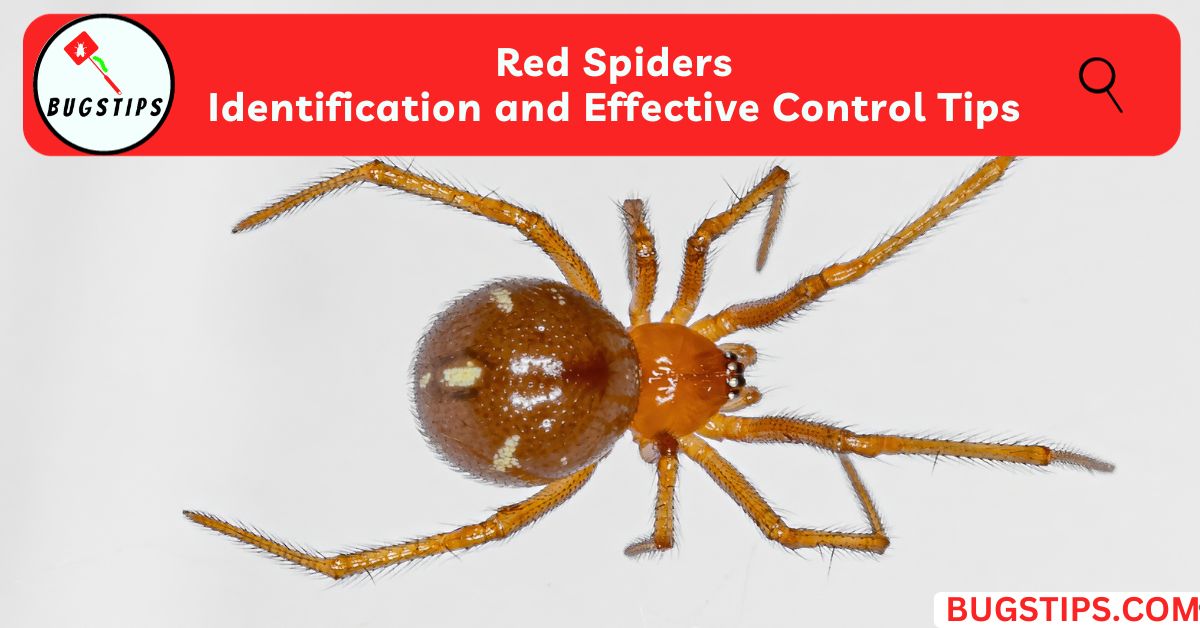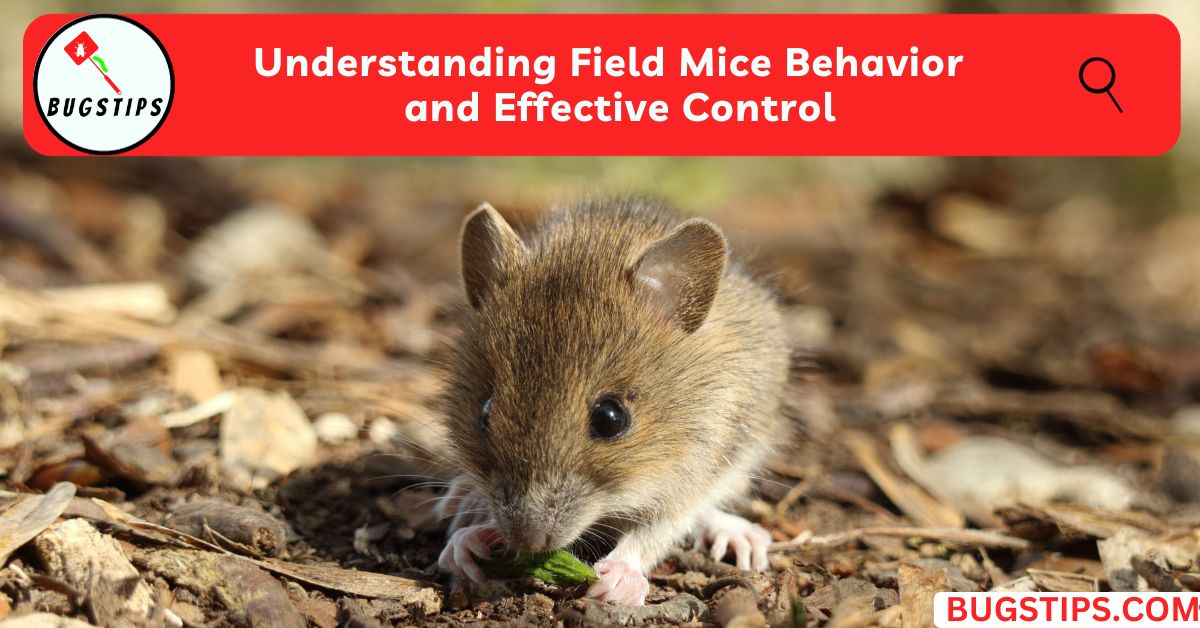This post may contain affiliate links which means as an Amazon Associate, this site may earn a small commission on qualified purchases made through links at no extra cost to you. Learn more on Affiliate Disclosure
Raccoons are fascinating creatures that are beloved for their curious nature and adorable looks. But what do raccoons eat?
As omnivorous mammals, they have a varied and opportunistic diet that includes fruits, vegetables, nuts, insects, and small animals. They can also eat human food and garbage, which can create conflicts with humans.
In this article, we’ll take a closer look at what raccoons eat and why they’re such adaptable feeders. We’ll also explore their favorite foods and discuss what they should avoid. Additionally, we’ll cover what baby raccoons eat and how their diet changes as they grow.
By the end of this article, you’ll have a better understanding of raccoons and their eating habits. You’ll also learn practical tips for coexisting with these furry neighbors while respecting their natural diet.
So, are you ready to find out: What do raccoons eat? Let’s dive in!
What Do Raccoons Eat? Complete List
Raccoons have a diverse diet that allows them to adapt to various environments. In this section, we’ll explore the different food sources raccoons eat.
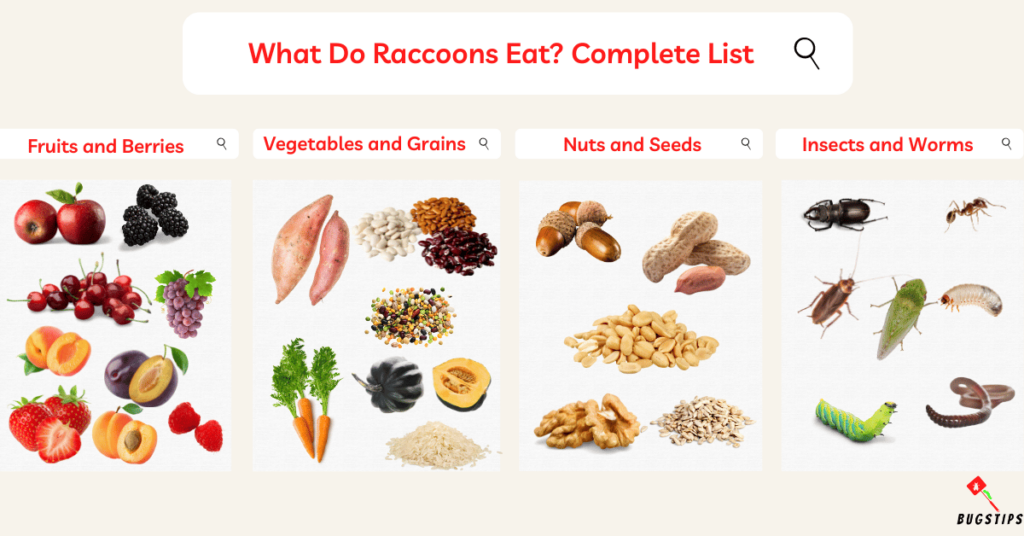
Fruits and Berries
- Raccoons have a sweet tooth when it comes to fruits and berries.
- Some of the fruits they enjoy include apples, blackberries, cherries, grapes, peaches, plums, various berries like raspberries, blueberries, and strawberries, citrus fruits like oranges and lemons, persimmons, wild grapes, mulberries, and apricots.
- These fruits provide raccoons with hydration and essential vitamins.
- In fact, raccoons are known to raid gardens and orchards, indulging in ripe fruits, which can sometimes lead to significant damage to crops.
Vegetables and Grains
- Raccoons will also eat a variety of vegetables and grains.
- They eat a variety of plant-based foods, including beans, corn, oatmeal, rice, wheat, rye, barley, carrots, sweet potatoes, squash, and peas.
- These plant-based food items provide raccoons with a good source of carbohydrates and other essential nutrients.
Nuts and Seeds
- Raccoons have a knack for cracking open nuts and relishing their contents.
- They enjoy acorns, beech nuts, groundnuts, peanuts, walnuts, sunflower seeds, pumpkin seeds, and corn kernels.
Insects and Worms
- In their pursuit of protein-rich meals, raccoons actively hunt for insects and worms.
- They eat beetles, ants, leafhoppers, true bugs, scale insects, bees, wasps, grasshoppers, crickets, cockroaches, caterpillars, earthworms, and grubs.
- These tiny creatures are a vital part of a raccoon’s diet, supplying them with essential nutrients.
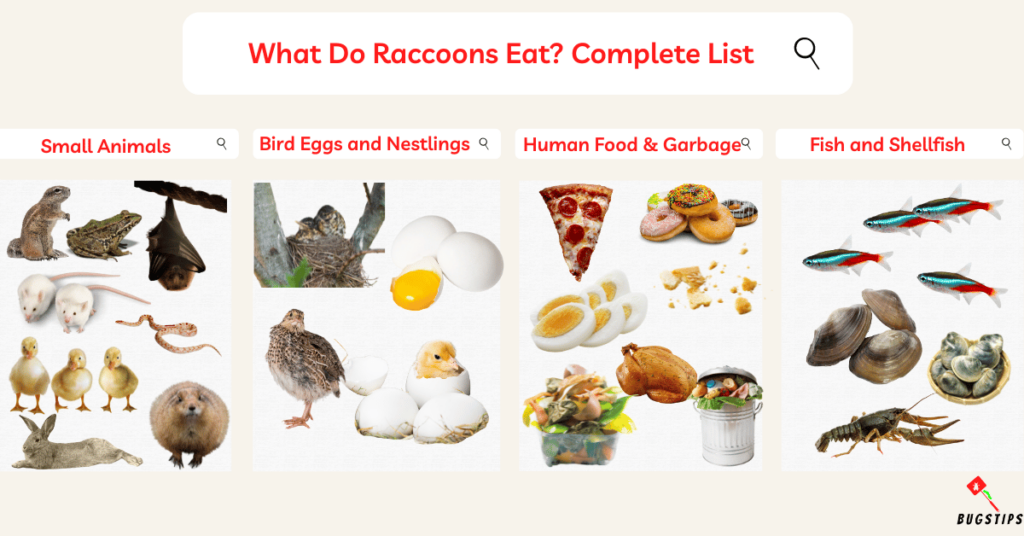
Small Animals
- Raccoons have the hunting skills required to capture small animals.
- They prey on squirrels, mice, rats, gophers, rabbits, bats, voles, muskrats, ducks, and even certain species of snakes, frogs, and snails.
- Raccoons are skilled predators and can adapt their diet according to the available food sources in their habitat.
- However, it is worth noting that raccoons tend to avoid consuming dead animals unless they are fresh.
Bird Eggs and Nestlings
- Raccoons have a knack for locating bird nests and enjoying the delicacy of bird eggs and nestlings.
- They are skilled climbers and can reach nests located in trees or on rooftops.
- Raccoons will eagerly feast on eggs and young birds, causing concerns for bird enthusiasts and conservationists.
Human Food and Garbage
- Raccoons have adapted remarkably well to urban environments and have learned to exploit human food sources.
- They are notorious for rummaging through garbage cans, seeking out discarded meals and scraps.
- Additionally, raccoons have been known to indulge in human foods such as pizza and donuts.
Fish and Shellfish
- Raccoons are skilled fishers and are known to catch fish from ponds and other water bodies.
- They also enjoy feasting on shellfish, such as clams, and crayfish.
- Their adeptness at hunting aquatic prey makes them a formidable predator in freshwater ecosystems.
Related Article – What Do Praying Mantis Eat?
What Do Baby Raccoons Eat?
Just like their adult counterparts, baby raccoons, or raccoon kits, have specific dietary needs during their early stages of life.
Let’s explore the diet of baby raccoons and how it differs from that of adult raccoons.
Mother’s Milk
- During their initial weeks of life, baby raccoons rely solely on their mother’s milk for nourishment.
- The milk provides them with essential nutrients, antibodies, and hydration necessary for their growth and development.
- Mother raccoons produce milk rich in fats and proteins to support the rapid growth of their offspring.
Transition to Solid Foods
- As baby raccoons grow older, they begin the gradual transition from a milk-only diet to solid foods.
- This process usually starts when they are around 7 to 8 weeks old.
- Initially, the mother raccoon introduces small amounts of solid food to her kits, helping them develop their chewing and digestion abilities.
Soft Foods and Prey Items
- During the weaning process, baby raccoons primarily consume soft and easily digestible foods.
- These include soft fruits, vegetables, and grains.
- Apples, pears, bananas, and mashed vegetables like sweet potatoes and squash are commonly introduced to the kits.
- As baby raccoons continue to mature, their diet gradually incorporates more protein-rich foods.
- Mother raccoons teach their offspring hunting skills by bringing them small prey items, such as insects, worms, and small rodents.
- This helps the young raccoons develop their predatory instincts and feeding behaviors.
Learning from Observation
- Baby raccoons learn about suitable food sources by observing their mother’s behavior.
- They observe her eating habits, mimic her food choices, and gradually expand their diet based on her guidance.
- This learning process allows the kits to acquire the necessary skills and knowledge to survive in their environment.
Baby raccoons require a well-balanced diet to support their rapid growth. Their diet should provide adequate amounts of proteins, fats, carbohydrates, vitamins, and minerals. This balanced nutrition is essential for the kits to develop strong bones, muscles, and a healthy immune system.
Related Article – What Do Earwigs Eat?
What Can Raccoons Not Eat?
While raccoons have a diverse diet and are highly adaptable, there are certain foods that should be avoided as they can be harmful to their health.
Here are some food items that raccoons should not eat.

Junk Foods and Processed Snacks
- Raccoons should not consume junk foods or processed snacks.
- These items, such as chips, sweet candies (including chocolates and processed sugars), and processed snacks, are high in salt, sugar, and unhealthy fats.
- Feeding raccoons these types of foods can lead to nutritional imbalances and potential health problems.
Spices
- Spices like onions, cayenne pepper (hot sauce), and garlic should be avoided in raccoon diets.
- These ingredients contain compounds that can be toxic to raccoons and may cause digestive issues, including stomach upset and potential damage to their red blood cells.
- It’s important to keep raccoons away from any food items seasoned with these spices to ensure their health and safety.

Processed Grains
- Raccoons should not be given processed grains, particularly bread.
- Yeast in bread can cause digestive problems.
- Feeding them bread or similar processed grain products in excess can lead to malnutrition and digestive problems.
Related Article – 16 Powerful Scents That Repel Chipmunks
Raisins and Macadamia Nuts
- Raisins and macadamia nuts are foods that raccoons should not consume.
- Raisins, in particular, can be toxic to raccoons and may cause kidney damage or other serious health issues.
- Macadamia nuts contain substances that can be harmful to raccoons and may cause muscle weakness, tremors, and other adverse effects.
Avocados
- Avocados are another food item that raccoons should avoid.
- Avocado contains a substance called persin, which is toxic to many animals, including raccoons.
- Ingesting avocados can lead to stomach upset, difficulty breathing, and other adverse reactions.
Cow’s Milk and Coffee
- Raccoons should not be given cow’s milk or coffee.
- Like many mammals, raccoons lack the necessary enzymes to digest lactose found in cow’s milk.
- Consuming cow’s milk can lead to digestive issues, including diarrhea.
- Similarly, coffee contains caffeine, which is toxic to raccoons and can cause various health problems, including restlessness, increased heart rate, and potential cardiac issues.
You May Also Like – 20 Impressive Fox Sounds You Need To Hear
Do Raccoons Eat Pets?
Raccoons are curious and intelligent animals and may venture into residential areas in search of food, water, or shelter.
While raccoons generally do not target pets as prey, interactions between raccoons and pets can occur, which may cause some level of disturbance or conflict.
Despite not posing a direct threat to pets, raccoons can carry diseases such as rabies and distemper, which can be transmitted to other animals, including pets, through bites or scratches.
Therefore, it’s important to ensure that pets are up to date with vaccinations and kept away from potentially infected wildlife.
Additionally, if a raccoon feels threatened or cornered, it may defend itself. This can lead to skirmishes or injuries, especially if pets approach raccoons too closely or exhibit aggressive behavior toward them.
You May Also Like – Squirrel Poop vs Rat Poop: A Detailed Comparison
Feeding Habits of Raccoons
Raccoons have distinct feeding habits shaped by their opportunistic and adaptable nature. Here are some common questions about raccoons’ feeding habits.
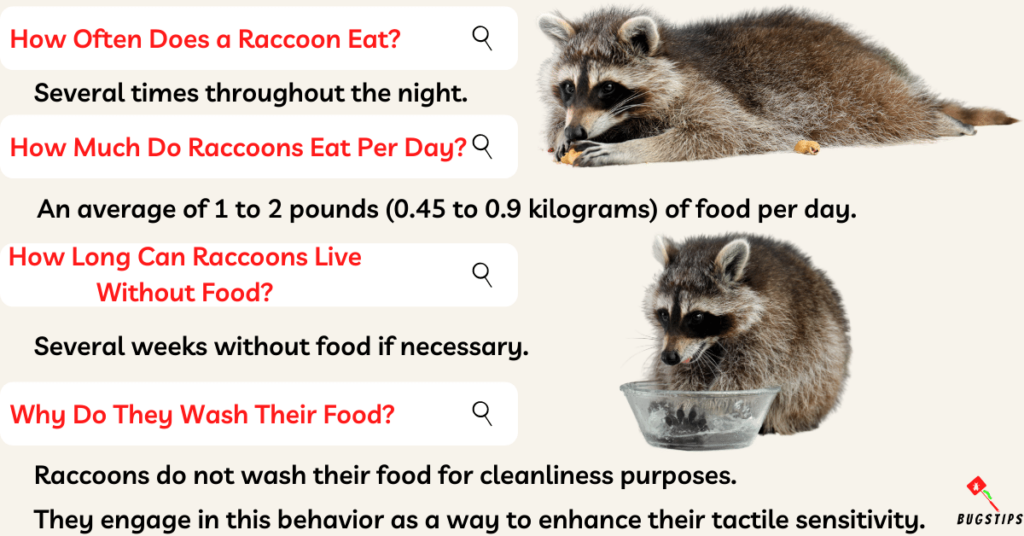
How Often Does a Raccoon Eat?
Raccoons are primarily nocturnal animals, and their feeding patterns align with their active nighttime behavior.
They typically forage and feed during the night, seeking out various food sources. However, their feeding frequency can vary depending on factors such as food availability, season, and individual circumstances.
On average, raccoons may feed several times throughout the night, taking breaks in between to search for new food sources or rest.
They are opportunistic feeders, taking advantage of the abundance and accessibility of food when it is available.
You May Also Like – Do Gophers Have Tails? | Amazing Facts
How Much Do Raccoons Eat Per Day?
The amount of food a raccoon consumes per day can vary based on several factors, including the availability of food resources, the raccoon’s size, age, and overall health.
Adult raccoons can eat roughly one-fifth of their body weight in food daily. This equates to an average of 1 to 2 pounds (0.45 to 0.9 kilograms) of food per day for a healthy adult raccoon.
However, raccoons have a flexible appetite and can adjust their food intake based on the availability of resources.
They are skilled at adapting their feeding behavior to match the season and the food sources that are most abundant at any given time.
How Long Can Raccoons Live Without Food?
Raccoons, like many mammals, have the ability to survive for extended periods without food. This adaptability allows them to withstand periods of scarcity or unfavorable conditions.
While the exact duration can vary depending on the raccoon’s health and environmental factors, they can typically survive for several weeks without food if necessary.
However, it’s important to highlight that prolonged periods without food can have detrimental effects on raccoons’ overall health and well-being.
Extended hunger can weaken their immune system, lead to weight loss, and increase their vulnerability to diseases and other threats.
Why Do They Wash Their Food?
One peculiar behavior commonly associated with raccoons is their habit of washing their food before eating it. This behavior, known as “dousing,” involves dipping their food items in water or repeatedly wetting them.
Contrary to popular belief, raccoons do not wash their food for cleanliness purposes.
Instead, it is believed that they engage in this behavior as a way to enhance their tactile sensitivity.
By wetting their paws and manipulating their food, raccoons can better assess its texture and quality in the dark, relying on their highly sensitive nerve endings.
You May Also Like – Skunk Smell in House at Night
Do Raccoons Fight for Food?
Raccoons are generally solitary animals and do not typically compete for food. However, in areas where food is scarce, raccoons may become more aggressive in their search for food.
This can lead to conflicts between raccoons and other animals, as well as property damage as raccoons search for food sources.
Is It Safe To Feed Wild Raccoons?
Feeding wild raccoons can lead to a range of issues, both for the raccoons and for humans. Here are some important points to consider.
- Regular feeding can make raccoons dependent on human-provided food, disrupting their natural foraging behaviors and potentially causing imbalances in their diet.
- Raccoons that become accustomed to receiving food from humans can lose their fear of humans, leading to potentially dangerous situations.
- Feeding raccoons improper or inappropriate food can lead to nutritional deficiencies, obesity, and an increased risk of diseases.
- Raccoons that are fed regularly can become a nuisance, attracting more raccoons to an area and potentially causing conflicts with neighbors.
Tips for Feeding Raccoons Safely
If you decide to feed raccoons despite the potential risks, it’s essential to follow these guidelines to ensure the safety and well-being of both the raccoons and yourself.
Feed in Moderation
- Provide small amounts of appropriate food to avoid overfeeding and dependency.
- This mimics the natural foraging behavior of raccoons and encourages them to seek out a varied diet in their environment.
Offer Natural Food
- Choose suitable natural foods that align with raccoons’ natural diet, such as fruits, vegetables, or unsalted nuts.
Use Secure Containers
- Use secure containers or designated feeding stations to prevent raccoons from accessing pet food, trash, or other potential food sources that can create dependency and nuisance behavior.
Maintain Distance
- Do not try to touch or handle raccoons while they are eating, as they may become aggressive if they feel threatened.
Maintain Cleanliness
- Clean up food remnants and feeding areas promptly to prevent the attraction of pests, including rats or other wildlife that may compete with raccoons for food.
Check local laws and regulations regarding feeding wildlife, as some states may prohibit or restrict the feeding of raccoons or other wild animals.
What Animals Eat Raccoons?
While raccoons are skilled and adaptable predators themselves, they are not without their own predators in the animal kingdom. Various predators may pose a threat to raccoons, especially the young and vulnerable.
Here are some common predators of raccoons.
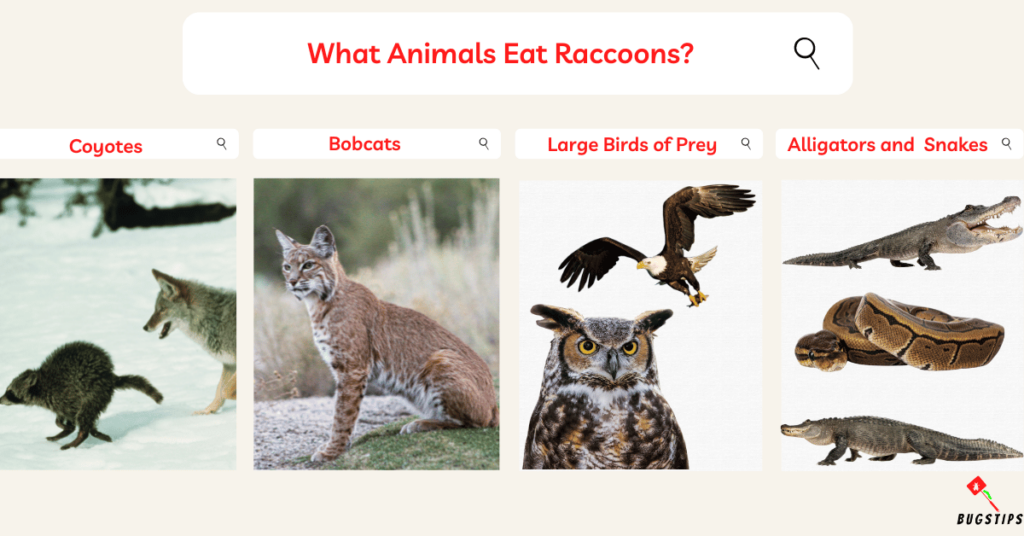
Coyotes
- Coyotes are opportunistic predators known to hunt and prey upon raccoons.
- They are skilled hunters and have the ability to pursue raccoons, particularly during times when other food sources are scarce.
Bobcats
- Bobcats, being agile and stealthy hunters, are also capable of preying on raccoons.
- They possess the necessary hunting skills to ambush and capture raccoons, especially young or injured individuals.
Large Birds of Prey
- Great Horned Owls: These powerful nocturnal hunters have been known to prey upon raccoons, particularly smaller or juvenile ones.
- With their keen eyesight and silent flight, great horned owls can swoop down and capture raccoons from the ground or trees.
- Eagles: Certain large species of eagles, such as the bald eagle and golden eagle, are capable of hunting raccoons.
Alligators and Large Snakes
- In areas where raccoons coexist with alligators, particularly in wetland habitats, alligators may occasionally prey upon raccoons that venture too close to the water’s edge.
- Large snakes, such as pythons or boa constrictors, have been known to prey on raccoons when given the opportunity.
You May Also Like – Snake Poop 101
Domestic Dogs
- Unsupervised domestic dogs may prey on raccoons, particularly if they feel threatened or cornered.
Humans
- Apart from natural predators, raccoons face threats from human activities such as hunting and trapping.
- In certain regions, raccoons may be hunted for their fur or as a form of wildlife control.
- Raccoons may also become victims of roadkill.
Final Thoughts
Raccoons are known to have a diverse diet that includes small animals such as crayfish, fish, frogs, clams, snails, plant-based foods like sweet corn, watermelon, and grapes, which are some of their favorite foods.
As humans, we can appreciate and respect their natural diet by being mindful of our own food waste and securing potential food sources to prevent raccoons from scavenging.
While it may be tempting to feed them, it’s important to avoid doing so to prevent negative impacts on their health and behavior.
By taking these steps, we can help ensure that these curious and adaptable animals continue to thrive in their natural habitat and bring a sense of wonder and joy to those who encounter them in the wild.
FAQs
Do raccoons eat dead animals?
Yes, raccoons may eat fresh dead animals if they come across them.
Will a raccoon eat a boiled egg?
Yes, raccoons can eat boiled eggs, although they are not a typical part of their natural diet.
Can raccoons eat pizza?
Raccoons may eat pizza if it is available to them, but it is not a recommended or healthy food for them.
Can raccoons eat chocolate?
No, chocolate is toxic to raccoons and should be avoided. It can be harmful to their health.
Can raccoons eat donuts?
Raccoons may eat donuts if they have access to them, but they are not a suitable or nutritious food for them.
Do raccoons eat fish from ponds?
Yes, raccoons are known to eat fish from ponds or other water bodies when they can catch them.
What are raccoons’ favorite foods?
Raccoons have a varied diet, but some of their favorite foods include watermelon, sweet corn, grapes, crayfish, frogs, fish, clams, and snails
Can raccoons eat cat food?
Raccoons may eat cat food if they have access to it, but it is not recommended to intentionally feed them cat food.
What kind of vegetables do raccoons eat?
Raccoons may eat a variety of vegetables, including carrots, sweet potatoes, squash, and corn.
Do raccoons steal food?
Raccoons are opportunistic foragers and may take advantage of unsecured food sources, leading to the perception of “stealing” food.
Can baby raccoons feed themselves?
No, baby raccoons cannot feed themselves initially and rely on their mother’s milk. As they grow older, they learn to forage and hunt under their mother’s guidance.
Do raccoons eat chickens?
Yes, raccoons are known to prey on chickens and other small livestock.
Are raccoons attracted to bird feeders?
Yes, raccoons can be attracted to bird feeders as they seek out easily accessible food sources.
Do raccoons eat squirrels?
Raccoons may eat squirrels if they can catch them, but it is not a typical part of their diet.
Do raccoons eat cats?
While raccoons generally do not prey on cats, there have been rare instances where conflicts between raccoons and cats have occurred.
Do raccoons eat rabbits?
Yes, raccoons are known to eat rabbits if they can catch them.
Resources – (for further reading)
The Ohio State University – The Food and Breeding Habits of the Raccoon
The Oregon State University – Raccoon – OSU Extension Service

